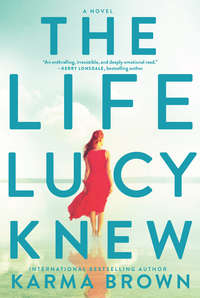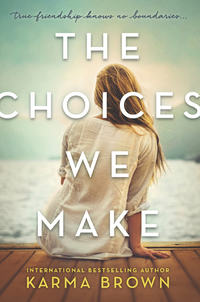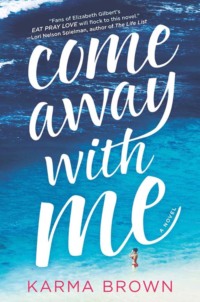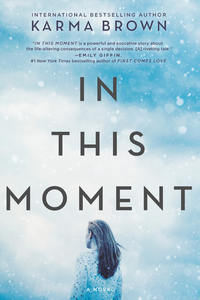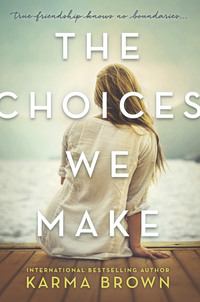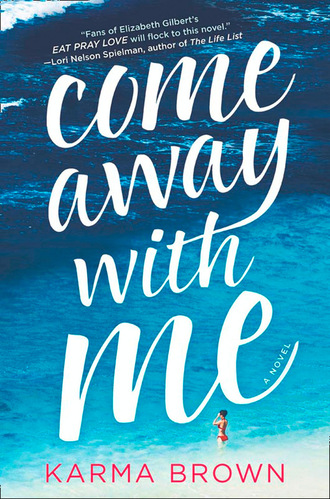
Полная версия
Come Away With Me
I frown, tapping the phone’s calendar icon. What’s the date? It pops up right away, big and bold across my screen. March 27th. I stare at it, and for a moment nothing happens, even though I now know exactly why Rosa called.
Then I stand so quickly I’m light-headed, and my phone drops softly to the carpet under my feet. A moan escapes me, and I claw for things to keep me upright as I stumble clumsily toward the bathroom like I’ve had one too many. My hand finds Gabe’s guitar, and a layer of dust transfers from it to my hand. It hasn’t been touched since before the accident; now just another piece of furniture in our bedroom.
Today was my due date.
I can’t breathe or see through my tears. The guilt of losing track of the days, of this day, socks me in the stomach like a punch. Gagging, I fall heavily to my knees in front of the toilet and vomit violently, though there’s little to leave my stomach. After I’m done, I sit on the bathroom mat and rock back and forth. My hands clutch my now concave belly, which will never swell with a child again.
All I want is to sleep, to escape all this for even a few hours. I lean against the toilet’s lid and get to my feet, shaky from the purging. Opening the medicine cabinet, I scan the bottles until I find what I’m looking for. The sleeping pills. I am one of those people who will suffer through a blinding migraine rather than take a pill, so the bottle is still full.
Wrapping my fingers around the small narrow bottle, I use the other hand to fill a glass with water from the bathroom sink. Staring into the mirror, I see a woman who used to care about how she looked, who others might have called pretty, whose stringy hair now hangs in front of vacant eyes, her face full of dark shadows and hollows. I don’t want to be this woman anymore.
I open the cabinet again and take out another bottle, then make my way back to bed with the glass of water in one hand and two pill bottles clutched in the other.
First, I swallow the morphine left over from my surgery. The bottle is nearly half-full, so it takes a while to get them all down. I don’t rush, because I don’t want to throw up again. Then I put the empty morphine bottle in my nightstand drawer, tucked deeply into a box of tissues, and pop the lid of the other bottle. The label says to take one pill at bedtime, and not if pregnant or breastfeeding. No problem there. I shake out two little white pills, which I swallow easily with a sip of water. Then I take out two more, and do the same. And then, just to be sure they work, shake out the last one and down it goes. Sleep will not elude me today.
They say it was good my mom showed up when she did.
11
As strange as it sounds, I like being here. It’s busy, which means plenty of distractions. And unless I have a visitor, there are no reminders of what has put me here in the first place.
Like any other floor on the hospital, the linoleum tiles carry black scuff marks; the beeps and bells work tirelessly to disturb even the deepest, most pharmaceutically induced sleep; and the smells of rubbing alcohol and cafeteria food permeate the air. The only difference on this floor is how one gets in, or out of, the unit: through windowless doors, with high security locks. While some might feel captive here, I feel safe.
Welcome to the psychiatric ward.
It has been just over a week since I swallowed the pills. I wasn’t really trying to kill myself, despite what it says on my chart. I was simply searching for a moment of peace from the grief. I wanted to sleep without having nightmares. I was tired of the pain that lives in my chest. That’s all it was. But when you end up in the ER, rushed by ambulance and barely breathing because of a bellyful of painkillers and sleeping pills, you get a good old-fashioned stomach pumping, a charcoal chaser and two weeks in the psych ward.
Also, you get to talk a lot about how you’re feeling to perfect strangers.
“How are things today?” Dr. Rakesh, an extremely tall and thin man, midfifties I figure, with a musical accent, asks. His kind, chocolate-brown eyes are unblinking behind his wire-rimmed glasses, which are too small for his features. He takes a sip from the mug of tea beside him and waits. The tea’s peppermint notes clog my nose, reminding me of candy canes. I don’t want to think about candy canes.
Dr. Rakesh asks me this question every morning, at the beginning of our hour-long sessions. Then I hear it again, by whichever on-call doctor has the luck to be on the ward that day. Then by the nurse drawing blood to check my medication levels, by the food services delivery person and by any visitors I have. “Better” has become my response of choice. It seems positive enough, without being completely dishonest.
“Good, good,” Dr. Rakesh says. “Better is what we hope for.” I nod, and he smiles, displaying two rows of quite straight but yellowing teeth. Along with the tea’s mint, his breath carries the sour smell of a not-long-ago-smoked cigarette.
“Do you think I can get my necklace and rings back today?” The ER staff removed all my jewelry when I was admitted. And although it seems highly unlikely I’ll be able to strangle myself with my necklace, and certainly my rings pose no threat, the staff here are firm. I’ll get it all back in a week when they let me out.
As I expect, he shakes his head. “Sorry, Tegan, but we can’t give them to you until you’re released.” He sips his tea again.
I run my right thumb around the base of my left ring finger, the skin still holding a slight indentation from my engagement and wedding bands. Which makes me think of Gabe.
As if sensing the mental shift to my husband, Dr. Rakesh jumps right in. “I’d like to talk about Gabe today, if that’s okay with you?”
“Okay,” I say, pressing my thumb more deeply into the skin of my ring finger. My heart batters my chest wall with sudden fury. I don’t want to talk about Gabe. I don’t want to think about Gabe.
“Tell me your favorite story about your husband,” Dr. Rakesh says. I stare at him, and he offers a warm smile, but this time without teeth. It’s a better look for him. “I’d like you to tell me something about Gabe that makes you happy.”
I close my eyes, letting the anger dissipate before speaking. I know exactly which story to tell.
“We went to Maui after Gabe passed the bar exam. It was a gift from his parents,” I say, eyes still closed to soak up the memory without distraction. “We had surf lessons planned for the end of the trip, but then the pig thing happened.”
“The pig thing?” Dr. Rakesh asks. “I’m intrigued.”
I open my eyes. Dr. Rakesh sits forward, notepad resting on one thigh. Aside from the date at the top of the page, he has only scrawled two words. Gabe-accident. I pull my gaze away and float back to Hawaii.
“It was the day before our first surf lesson and we decided to do the drive to Hana. Have you been to Maui?”
Dr. Rakesh shakes his head. “It’s on my bucket list, though,” he says.
“You really should go,” I say. “It’s beautiful.”
“So I’ve heard.”
“Anyway, Hana is a town in Maui that is completely isolated from the rest of the island. To get there you drive this superwindy highway, which is really only a narrow two-lane road,” I say. “It takes about four hours but it’s worth it. Unless you get carsick.”
Dr. Rakesh raises an eyebrow. “Noted,” he says.
“There are so many cool stops along the way, and one is this general store that’s been there since the early nineteen hundreds.” I spell the store’s Hawaiian name out when he asks so he can write it down. He’s good at feigning interest, no question.
“It’s a family business and carries everything you could ever imagine. They also have this amazing banana bread. Like, the best banana bread I’ve ever had.”
“Oh, I do love banana bread,” Dr. Rakesh says, writing the two words underneath the store’s name, and underlining them twice for good measure.
“Me, too.” I swallow against the sadness creeping up. It was such a happy time. Stuffed full of buttery banana bread and boundless love. “We were getting back into the car when we heard this high-pitched squeal. But we had no clue what it was.”
Dr. Rakesh shifts and crosses one leg over the other, leaning back in his chair. He rests the notepad against his knee and waits for me to go on.
“There was this tiny potbellied pig, no bigger than a kitten. A bunch of motorcycles were driving into the parking lot and the pig was freaking out because of the noise,” I say. “It ran in circles, squealing, and for a second it looked like it was going to become bacon.”
Dr. Rakesh grimaces slightly. “I’m a vegetarian,” he says, by way of explanation.
“Oh, sorry,” I say, but he waves the apology away.
“Did they stop?” he asks, leaning forward now.
I nod. “Just, and Gabe managed to catch the pig. Turns out it was the family pet. We got five loaves of banana bread as a thank-you,” I say, smiling.
“Do you blame Gabe for the accident?” Dr. Rakesh asks, and I’m irritated by the way he suddenly shifts gears in what I assume is an attempt to throw off my guard.
“Yes,” I respond without pause. “He was going too fast.”
He writes something down, but I can’t see what because he’s shifted the notepad up. “There was black ice that night, wasn’t there?”
I nod. He must have seen the accident report. Also, he didn’t have both hands on the wheel because one of them was up my skirt—which I was happy about.
“If he’d been driving the speed limit and the accident had happened, would you still feel it was his fault?”
Pause. “I don’t know, but that isn’t what happened.”
More writing, more nodding from the sneaky Dr. Rakesh.
“I told him to slow down,” I say, noting how weak my voice sounds. “But we were late for his parents’ party.”
“Tegan, were you trying to hurt yourself with the pills?”
I’m getting whiplash from the change in direction with his questions.
“No. I told you that already,” I say. “It wasn’t about that. I was still having pain from my injuries, and I was exhausted. I just wanted to sleep. That’s all.” I consider asking him if he’s trying to kill himself with the cigarettes.
He nods, and I’m not sure how to take it. Does he believe me? Is he placating me? “I’ve read the accident report,” he continues. “And the police seemed to feel it was exactly as it was called. An accident. It wasn’t anyone’s fault, Tegan. Yours included.”
“Of course it wasn’t my fault,” I snap. “I wasn’t driving the car.”
“Do you blame yourself for losing the baby?”
“No.” What a stupid question.
Dr. Rakesh observes me for a moment, pen poised above the notepad. “In situations like these, the mother often feels guilty for the loss of the pregnancy.”
“Gabe was driving too fast,” I say, through clenched teeth. “I told him to slow down.”
“It’s okay to be angry, Tegan,” Dr. Rakesh says. “It’s part of the healing process. But at some point you need to decide if you can forgive Gabe, and yourself, for what happened.”
You don’t understand this at all, I think at him. But I keep my mouth shut. No matter how many fancy-looking degrees line his boring, almond-colored office walls, Dr. Rakesh is clueless.
“I think we’re done now,” I say, eyes darting to the clock behind him.
He glances at his watch. “Yes, you’re right. I’ll see you tomorrow. Maybe try to get outside for some fresh air today?”
I nod and push the cheap, vinyl-covered chair back. Without looking at Dr. Rakesh, I leave the room, rubbing my thumb around my ring finger, feeling the indentation again.
I take back what I thought this morning.
I hate this place.
12
I’ve only been home a few days, but between Gabe, both our sets of parents, my brothers and Anna, I feel more captive in my own apartment than I did in the locked-down psych ward. It takes a sweep of our medicine cabinet to make sure there’s nothing stronger than acetaminophen and cough syrup, along with promises to check in hourly via text and phone to get them all to leave me alone, but finally it’s quiet again. Aside from Gabe, who reiterates he’s not going anywhere.
At my second-to-last session with Dr. Rakesh I had what he called “an important step in the right direction.” Just shy of a breakthrough, I suppose, but good enough for the yellow-toothed doctor to sign the papers for my release. Of course, what he didn’t realize was that it was mostly fabricated. The tears were real, but the proclamations of forgiveness I knew he wanted to hear were rehearsed the night before, as I tried to fall sleep under my overstarched, scratchy hospital bedsheets. Back in his office, I felt the way my kindergarteners must when they’re trying to give me the answer they think I want, rather than the one that feels most true to them.
They released me with an antidepressant with so many side effects I’m not sure the pills are better than the depression, and two follow-up appointments with Dr. Rakesh over the next couple of weeks.
But I’m not about to forgive anyone yet, least of all Gabe.
“What are you doing?” Gabe asks, watching me pull out a large white melamine bowl from the bowels of our deep pantry. I hold it up to the kitchen’s halogen lights, then wipe the dusty inside of the bowl with a paper towel.
“I’m making banana bread,” I say, cracking the freckled skin on one of the squishy bananas. I glance at the recipe, the one Gabe coaxed out of the general store owner after he returned the pig, written on the back of a postcard picturing Maui’s black sand beach. I continue peeling the ripe, fragrant fruit until three mushy bananas pile up in the bottom of the bowl.
The oven beeps, letting me know it’s warm and ready, and I methodically drive the potato masher into the bananas before pouring in the whisked eggs and oil, and an overflowing cup of sugar. Setting the wet ingredients aside, I concentrate on the flour and baking soda, using my thumb to level the teaspoon full of soda.
“It probably won’t taste the same,” Gabe says. “Where are those from?”
I tilt my head to read the sticker from one of the discarded banana peels. “Costa Rica.”
I measure out another half teaspoon of baking soda, which I toss into the flour mixture.
I stir the flour, soda and salt around and around with the large wooden spoon Gabe’s mom gave me last Christmas, in the hopes I’d start making her Italian family’s famous tomato sauce. She’s chastised me continuously about my sauce spoons, reminding me the metal and plastic versions I typically use will ruin the taste.
I tried to make the sauce once, even using exorbitantly priced canned tomatoes imported directly from Italy and sweet basil from Rosa’s garden, but it had none of the flavor or depth of her sauce. Gabe said I was crazy, but I was sure Rosa left a critical ingredient off the recipe card she attached to the spoon. Just to make sure I couldn’t make it taste exactly like hers.
With a few quick stirs to blend the wet and dry ingredients together, I spatula-level the mixture into the pans coated with a healthy smear of butter, and set the timer. I sit at the kitchen island and pull out a magazine from the stack Anna brought over and flip the pages without commitment.
“I’m sure it will be good, even without the Maui bananas.”
“Mmm-hmm,” I mumble, keeping my eyes on the glossy pages without reading a word.
“I’m glad you’re baking again,” he says, keeping his voice light. I recognize the tone. It’s the one he uses when I’ve had a stressful day at work, or when our neighbor’s miniature dachshund howls at three in the morning and I threaten to storm over there and tell him exactly what I think he should do with the dog. “You look different, you know?”
“Do I?” I try to sound disinterested. But I’m actually curious. Different how? In a good way? Less depressed, maybe? I wonder what that looks like.
“Tegan?”
“Yeah?” I don’t look up. I can’t look up, because if I do, I know I’ll be back in bed for days. If someone told me you could love and hate a person so completely, at the same time, I would have said no way. But I would have been wrong.
My hate for Gabe drives as deeply into my body as my love for him does. And it’s tearing me in half, like my seat belt almost did when we hit that metal pole.
“Promise me you’ll never do anything like that again.”
“Like what?” I ask, knowing exactly what he means.
“Don’t do that, okay? This is serious.”
I sigh and slam the magazine shut. “Oh, this is serious? Wow, thanks, I didn’t realize that.”
“Stop fucking around, Tegan!” His blue eyes blaze with anger. “Do you even care what would have happened if your mom hadn’t found you? Do you know what that would have done to the people who love you?”
“I wasn’t trying to kill myself, Gabe. It was an accident.”
“No. No,” he says, voice rising. “An accident is pulling pink sheets that used to be white out of the washing machine because you forgot to double-check if those red socks were mixed in, or adding salt to cookies instead of sugar because they look the—”
“Or hitting black ice and killing our baby?” I shout, shaking with fury. I try to hold eye contact, but my rage makes it hard to focus on his face.
Gabe says nothing, his beautiful eyes filling with sadness. I turn my back and will him to disappear.
The timer starts its incessant beeping, and only then do I notice how glorious the kitchen smells. But instead of feeling comfort, the sweet smell turns my stomach. I choke back a sob and slam on the oven mitts so I can pull out the perfectly browned loaves. Gabe must have understood my wish, because when I turn to put the hot pans on the cooling rack, he’s not in the room anymore.
Alone again, I sit at the island and shove handfuls of the still hot, moist bread into my mouth, barely chewing. The heat ravages my tongue and lips, but I don’t stop until the whole loaf is gone. It turns out a dash of sorrow and a teaspoon of bitterness really will ruin even the best recipe.
Gabe’s right. It doesn’t taste the same.
13
“I’m sorry for what I said earlier.”
I have the worst stomachache, likely from the loaf of banana bread I gorged on; I’ve been nauseous ever since. But it may also be the argument that’s turning my guts. As much as I hate to admit it, my mom is right when it comes to my stomach. It’s sensitive to nerves and anything too spicy, as well as angry words I wish I could take back.
Gabe sighs at my apology, but doesn’t seem too angry. Though he really should be, after what I said. “It’s okay,” he says. “I know you didn’t mean it.”
I bite my tongue, because words I don’t want to say are trying to get out.
I did mean it. But that doesn’t change that I probably shouldn’t have said it.
We’re on the couch, watching television. Feeling guilty, and getting no relief from nearly an entire bottle of pink bismuth—the same bottle left over from our wedding day, coincidentally—I flip on a nature show Gabe loves and try to come up with the right words to convey my regret.
The television is muted, but on it a lion stalks a sick antelope that has been separated from its herd. At least I can’t hear the antelope’s screams when it realizes what’s happening, left alone to try and fight off the too fast, too strong lion. I understand how the antelope feels.
“I know Dr. Rakesh thinks I’m depressed,” I say, keeping my eyes on the antelope’s final moments. Solidarity with the abandoned, weak animal. “But I don’t feel depressed exactly. I feel...angry.” I take another swill of the thick, pink liquid and grimace as it coats my throat. “Doesn’t depression come after anger?”
“I can’t remember,” Gabe says. “Isn’t depression at the beginning?”
“No, anger comes before depression. I think. Or is it depression, anger and then acceptance?” I sigh. “I have no fucking idea. But no matter what order they come in, Dr. Rakesh was pretty clear there are no shortcuts.”
“I don’t know about that.” Gabe smiles at me. “You’re one smart cookie. I think if anyone can find a shortcut it would be you.”
“I don’t think I’m that special.”
“That’s your opinion,” Gabe says. “But I know you can do whatever you put your mind to, Teg. I’ve seen you in action, and it’s pretty freakin’ scary when you’re committed. Like that lion.” I look back at the screen, where the lion is tearing apart its prey, and grimace.
“I’m not sure that’s a compliment.”
Gabe smiles wider, one side of his mouth resting higher than the other, where a faint white line is the only remnant from a childhood dog bite that required two-dozen stitches inside his cheek. It’s adorably quirky, his smile.
“The old me might have agreed with you,” I say, tucking my knees up to my chest. I feel cold, but on the inside. No blanket or hot cup of tea can help with that. “But I don’t recognize myself anymore. I’m...lost.” I dip my head and let the tears fall onto my pajama bottoms. “And I’m afraid I’m never coming back.”
I close my eyes and feel Gabe’s hand. His fingers intertwine with mine, and his thumb gently tickles my palm. I stay very still so as not to disturb the moment.
“You will make it back, Teg,” Gabe says, his tone gentle. “And I’m going to be here every step of the way. Promise.”
I nod and stay as I am, the sensation of Gabe’s hand pushing away some of the sadness and leaving something in its place. Something I haven’t felt in months—possibility.
14
“Is this all you’re bringing?” My brother Jason stands in the doorway of the master bedroom holding my backpack. I glance up from the customs forms I’m filling out at the kitchen island.
“Yup,” I say, flipping the page over and working on the back side. “I don’t need much.”
“But it’s like, six weeks. You used to pack a bag bigger than this for an afternoon at the beach.” He chuckles, and I roll my eyes. “Looks like I’m rubbing off on you. Jase style. Nice.”
“Jase style?” Connor says. “You mean a pair of boxers and a T-shirt for a week?” Connor, the youngest of the three of us, sits beside me, looking over my to-do list. “Let’s hope nothing about you is rubbing off on Tegan.”
I nudge Connor with my knee. “Be nice.”
“Whatever,” Connor mumbles, before pointing at items five through twelve, which are unchecked and range from acetaminophen to travel-sized bottles of shampoo. “Did you get all this stuff from the pharmacy?”
Connor is cautious, analytical, thoughtful and headed toward a successful career in engineering, whereas Jason, though brimming with enthusiasm and that hard to qualify “joie de vivre,” seems allergic to regular employment, rules and generally being an adult. Though opposite in personality, they look so similar they’re often mistaken for twins. Unlike my brothers, with their well-muscled height, eyes the color of fresh-cut grass and sunshiny good looks, I’m dark-haired and brown-eyed. I’ve also been blessed—as my perpetually dieting mother likes to remind me—with string-bean legs, narrow hips and small boobs.
“Mom came over earlier with all that stuff, including six freaking bottles of Pepto-Bismol.” I give Connor a wry glance. “She’s very committed to this weak stomach of mine.”
“Can I have a bottle?” Jase asks, bringing my backpack to the front door. “Last night was a rough one.” Gabe, who is a last-minute kind of packer, laughs from the couch, where he’s reading a magazine. If there’s one thing Jason excels at, it’s being the life of a party.
“Take two bottles, Jase,” Gabe says. “I think you’re going to need them more than Teg will.”
I push the bottles of bismuth to the edge of the island. “Here you go.”
“Thanks!” Jase tucks a bottle in each back pocket of his jeans.
“Did you get all your shots?” Connor asks me, ignoring Jase, as usual.
“You make me sound like a dog at the vet!” He doesn’t smile. “Yes, I got my shots.”





